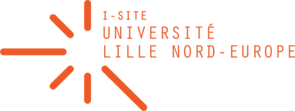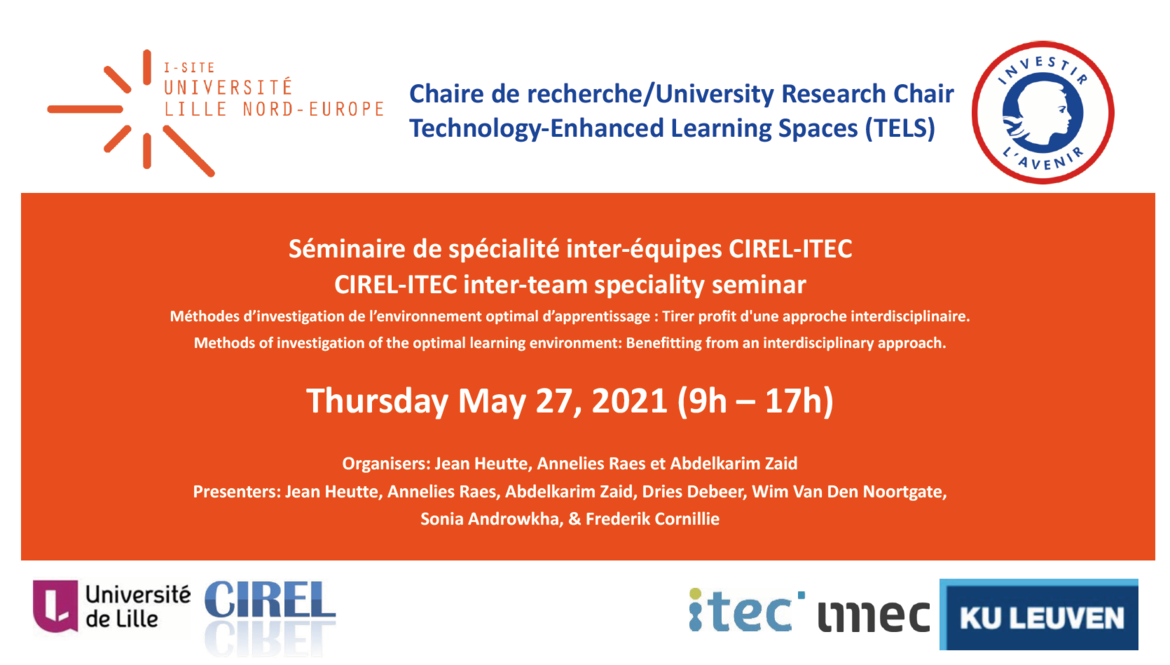Séminaire de spécialité inter-équipes CIREL-ITEC
D’un point de vue qu’il est possible de qualifier rétrospectivement d’humanistes, les premières investigations scientifiques concernant le fonctionnement humain optimal se retrouvent notamment dans les travaux de William James (1890), John Dewey (1922), Abraham Maslow (1968) ou Carl Rogers (1973). Depuis une cinquantaine d’années, suite aux recherches concernant la conception de dispositifs permettant d’utiliser l’ordinateur pour augmenter les capacités de l’intellect et de l’intelligence des organisations, notamment via l’invention de la souris d’ordinateur, de la visio- conférence, de la prise de notes partagée, dans un environnement informatique qui nous est désormais familier (menus, fenêtres multiples, liens hypertextes, des systèmes adaptives, etc.) réalisés sous la direction de Douglas Engelbart (1968), ce questionnement s’est progressivement étendu aux environnements d'apprentissage assistés par la technologie.
Au niveau international, depuis bientôt une trentaine d’années, celui-ci s’organise notamment autours des Learning Sciences (sciences de l’apprendre), dont le projet est d'étudier l'apprentissage dans divers contextes, qu’il soit formel comme informel, en contexte académique, au travail et/ou entre pairs (Stahl, Koschmann & Suthers, 2006). Ce champ de recherche interdisciplinaire englobe notamment la psychologie de l’éducation, les sciences cognitives et l’informatique (Sawyer, 2014) et ses recherches peuvent être caractérisées comme étant constituées de trois traditions méthodologiques : la conception expérimentale, descriptive et itérative. Il revendique cependant une perspective plus contextualisée et plus dynamique de l’apprentissage que l’approche strictement cognitiviste du traitement de l’information, en considérant le caractère situé, social et distribué de la cognition humaine. Ainsi, les recherches centrées sur l’environnement optimal d’apprentissage (Shernoff & Csikszentmihalyi, 2009) s'appuient sur une variété de perspectives théoriques notamment en lien avec les phénomènes d'apprentissage collectifs tels qu'ils se produisent dans un large éventail d'espaces physiques, sociaux et technologiques (Heutte, 2021; Jézégou, 2019 ; Raes, et al., 2020; Riva, et al., 2012 ; Zaid, et al. 2017), introduisant de nouveaux concepts comme ‘learning & teaching analytics’, de nouvelles méthodes d’investigation (Abbakumov et al., 2019 ; Androwkha, & Jézégou, 2019 ; Fievez et al., 2020 ; Van Den Noortgate et al. 2015; Vanneste et al., 2020), ainsi que de nouvelles controverses (scientifiques, épistémologiques, éthiques…) : design optimal, expérience optimale d’apprentissage, motivation optimale,...
Ce projet a été réalisé avec le soutien financier de l’État français dans le cadre du Programme « Investissements d’avenir » (I-SITE ULNE / ANR-16-IDEX-0004 ULNE) géré par l’Agence Nationale de la Recherche française (ANR).
Inscription au séminaire
—————————————————————————————————————————————————————————————————————————————————————————————————————————
From a point of view that can be described retrospectively as humanistic, the first scientific investigations into optimal human functioning can be found in the work of William James (1890), John Dewey (1922), Abraham Maslow (1968) or Carl Rogers (1973). Over the last fifty years, following research into the design of devices that enable the computer to be used to increase the capacities of the intellect and intelligence of organisations, in particular via the invention of the computer mouse, video-conferencing, shared note-taking, in a computer environment that is now familiar to us (menus, multiple windows, hypertext links, adaptive systems, etc.), carried out under the direction of Douglas Engelbart (1968), this questioning has progressively been extended to the technology-assisted learning environments.
At the international level, for nearly thirty years, this has been organised around the Learning Sciences, whose project is to study learning in various contexts, whether formal or informal, in an academic context, at work and/or among peers (Stahl, Koschmann & Suthers, 2006). This interdisciplinary field of research encompasses educational psychology, cognitive science and computer science (Sawyer, 2014) and its research can be characterised as consisting of three methodological traditions: experimental, descriptive and iterative design.
However, he claims a more contextualised and dynamic perspective on learning than the strictly cognitivist approach to information processing, considering the situated, social and distributed nature of human cognition.
Thus, research focused on the optimal learning environment (Shernoff & Csikszentmihalyi, 2009) draws on a variety of theoretical perspectives, notably in relation to collective learning phenomena as they occur in a wide range of physical, social and technological spaces (Heutte, 2021; Jézégou, 2019; Raes, et al., 2020; Riva, et al, 2012; Zaid, et al. 2017), introducing new concepts such as 'learning & teaching analytics', new methods of investigation (Abbakumov et al., 2019; Androwkha, & Jézégou, 2019; Fievez et al., 2020; Van Den Noortgate et al. 2015; Vanneste et al., 2020), as well as new controversies (scientific, epistemological, ethical...): optimal design, optimal learning experience, optimal motivation,...



